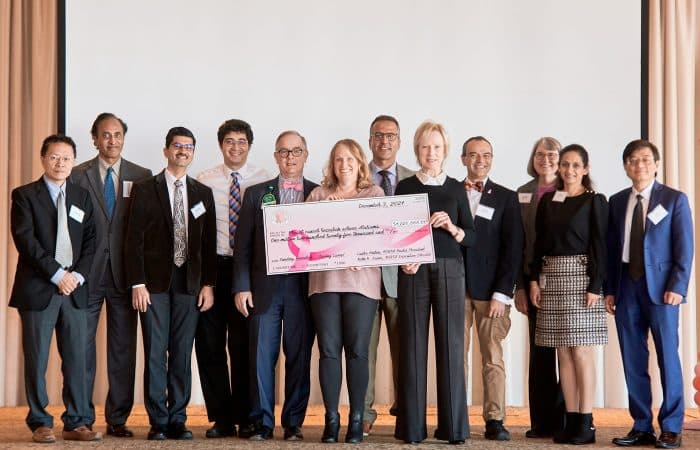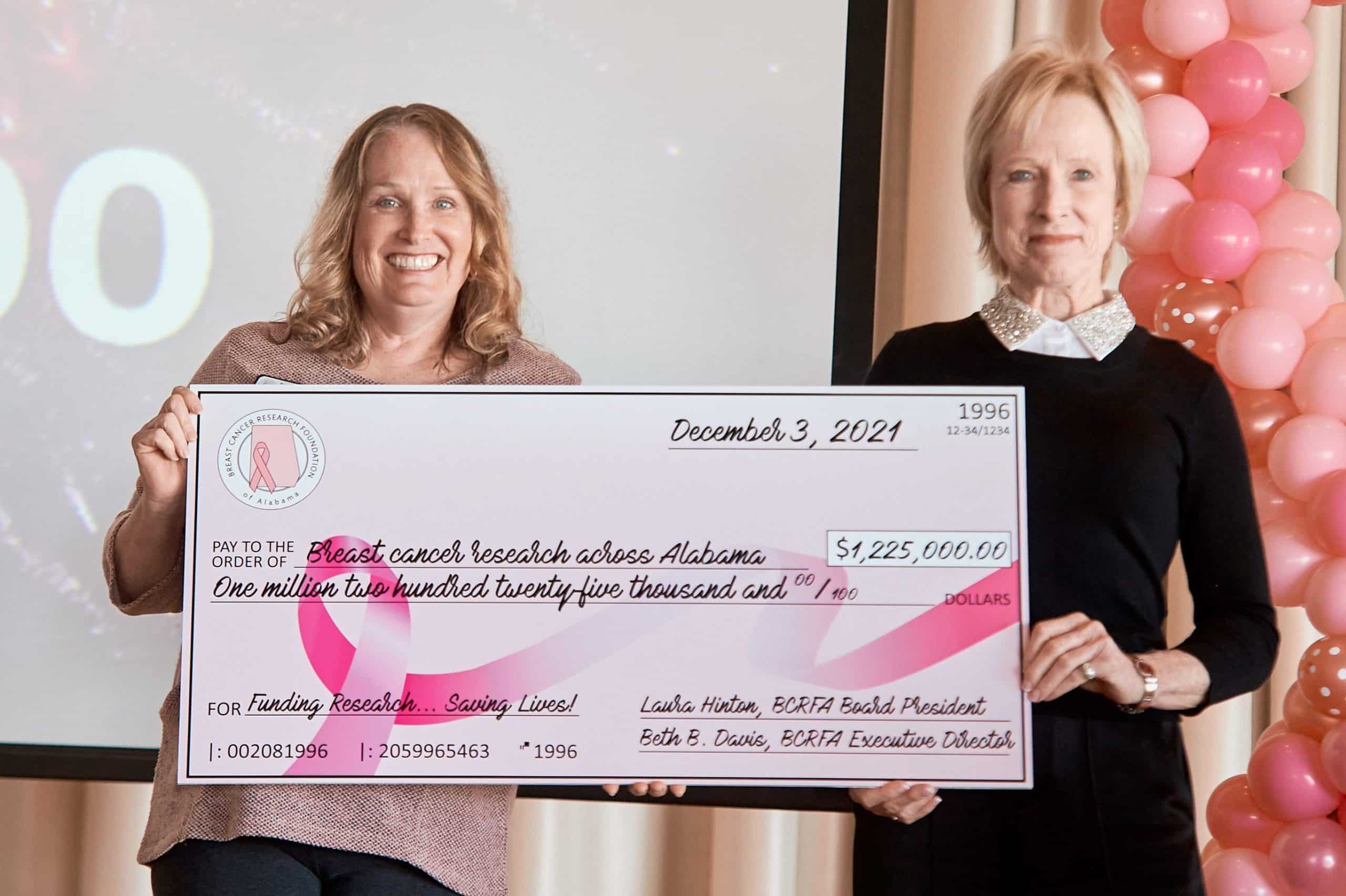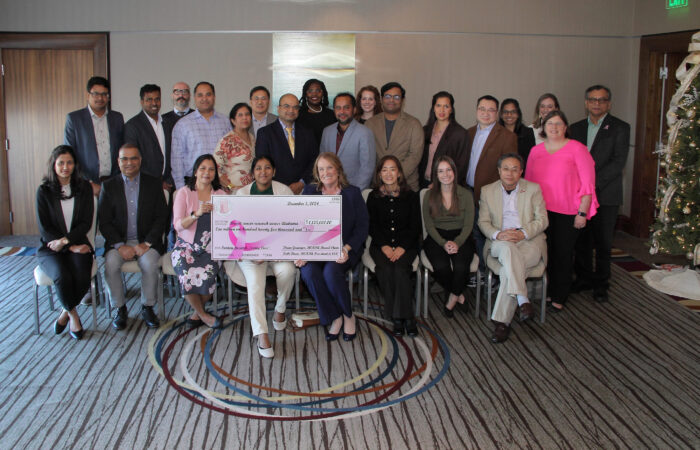Over 200 guests took a gamble on an evening of gaming, food, and fun with…

BCRFA exceeds $1.2 million investment in Alabama-based research

The Breast Cancer Research Foundation of Alabama (BCRFA) today announced a total investment of $1,225,000 in Alabama-based breast cancer research for 2021.
Grants fund 20 research projects across the state, including the O’Neal Comprehensive Cancer Center at the University of Alabama at Birmingham (UAB), Auburn University, CerFlux, the Mitchell Cancer Institute at the University of South Alabama, the University of Alabama, Southern Research, and HudsonAlpha Institute for Biotechnology. This year’s grant awards increase the BCRFA’s lifetime investment total to over $12 million since 1996.
“As the largest Alabama-based funder of breast cancer research across the state, the BCRFA has seen the undeniable power of research in accelerating the progress of treatments and outcomes for patients facing the disease,” said Beth Bradner Davis, BCRFA Executive Director. “We are proud that this historic investment—our largest ever—will continue to fuel breakthroughs and advance our mission to save lives.”

BCRFA dollars often function as “seed” funding for developing studies, allowing researchers to generate data needed to attract major national funding. Many BCRFA-funded projects have later received national grants from the National Institute of Health and others.
“The BCRFA has been an incredible partner of the O’Neal Comprehensive Cancer Center for 25 years,” said Dr. Barry P. Sleckman, director of the O’Neal Comprehensive Cancer Center at the University of Alabama at Birmingham. “By funding critical early-stage projects, the BCRFA is driving local discoveries that have a critical impact on breast cancer prevention, detection and treatment in the state of Alabama and beyond.”
2021 grant recipients include:
Auburn University (Auburn, AL)
- Panagiotis Mistriotis, PhD – “Integrating bioengineering tools, genome-wide genetic screens and in vivo models to discover new determinants of triple negative breast cancer cell invasion”
- Jingjing Qian, PhD – “Improving Breast Cancer Survival in Alabama – The Role of Medications”
- Gary Piazza, PhD; Donald Buchsbaum, PhD – “A novel β-Catenin blocker that activates antitumor immunity for breast cancer” (with University of Alabama at Birmingham O’Neal Comprehensive Cancer Center)
CerFlux (Birmingham, AL)
- Karim I. Budhwani, PhD – “Predictive Personalized Oncology Efficacy Test (POET) to Improve Breast Cancer (BC) Treatment Outcomes”
HudsonAlpha Institute for Biotechnology (Huntsville, AL)
- Sara J. Cooper, PhD – “Screening for Inherited Breast Cancer Risk in the Black Belt”
Southern Research (Birmingham, AL)
- Corinne E. Augelli-Szafran, Ph.D – “Development of novel Clofarabine analogs for breast cancer therapy”
The University of Alabama (Tuscaloosa, AL)
- Brandon Kim, PhD – “Breast cancer patient derived blood-brain barrier modeling to assess metastatic potential”
University of Alabama at Birmingham O’Neal Comprehensive Cancer Center (Birmingham, AL)
- Ahmed Elkhanany, MD – “Single-Arm Study of Osimertinib (TAGRISSO) and Olaparib (LYNPARZA) in Patients with Metastatic Triple Negative Breast Cancer (O2 Study)”
- Xu Feng, PhD; Douglas Hurst, PhD – “RANK Signaling Pathways in Breast Cancer Development”
- Selvarangan Ponnazhagan, PhD – “Combinatorial genetic immunotherapy and RANKL antagonism for breast cancer”
- Laura Rogers, MD; MPH; Robert Motl, PhD; Elliot Lefkowitz, PhD; Robert Oster, PhD – “Exercise, gut microbiome, and breast cancer: increasing reach to underserved populations”
- Jamil Saad, PhD, Microbiology; Yabing Chen, PhD, Pathology – “Structural basis for Fas-mediated apoptosis and mechanisms of inhibition in breast cancer”
- Rajeev Samant, PhD, Pathology; David Schneider; James Mobley; Dongquan Chen – “Characterization of hypoxia-specific adaption of ribosomes”
- Lalita Shevde-Samant, PhD; David Schneider, PhD; Dongquan Chen, PhD; Jim Mobley, PhD – “Hedgehog activity regulates nucleolar response to ribosomal DNA damage in breast cancer”
- Josephine Shinn, MD – The Management of Papillomatosis
- Keshav K. Singh, PhD – “Targeting Mitochondria in TNBC by Novel Inhibitors”
- Lizhong Wang, MD, PhD; Jianmei Leavenworth; Shi Wei; Sejong Bae; Lei Stanley Qi (Stanford University) – “CRISPR-perturbation single-cell platform to dissect the tumor-immune interaction and metastasis”
University of South Alabama Mitchell Cancer Institute (Mobile, AL)
- Santanu Dasgupta, PhD – “Exploring mitochondrial whole genome in Triple Negative Breast Cancer”
- Lyudmila Rachek, PhD – “Gene expression analysis in mouse breast cancer models with mitochondrial targeted TAT-hOGG1”
- Robert W. Sobol, PhD – “Overcoming breast cancer resistance to PARG inhibitor-induced cell death by NAD-modulation”
BCRFA funding is made possible with support from corporate partners; local, state, and federal funders; event patrons; community partners, generous individual donors; and sales of the Breast Cancer Research specialty license plate. Available at DMVs across the state, nearly 14,000 vehicles in Alabama sport the Breast Cancer Research tag. One hundred percent of tag sale proceeds received by the BCRFA support local, lifesaving research.
About the Breast Cancer Research Foundation of Alabama
Founded in 1996, the Breast Cancer Research Foundation of Alabama (BCRFA) is a nonprofit organization whose mission is to find a cure for breast cancer by funding promising breast cancer research in Alabama and raising community awareness and funding for that research. BCRFA funds promote a comprehensive approach to battling breast cancer by promoting collaborative and innovative research to help diagnose, treat, prevent, and eradicate the disease. With community support, BCRFA has invested over $12 million in life-saving breast cancer research. All funding stays in Alabama, but the impact is worldwide. Learn more about our mission and breakthroughs at www.bcrfa.org.



